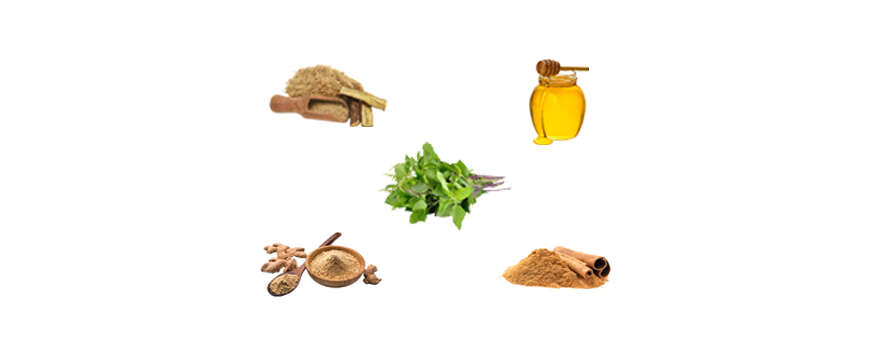Ayurveda is a traditional medicinal system that treats a variety of bodily afflictions by using natural herbs, spices, and other products as well as dietary and lifestyle adjustments. Ayurveda has gained popularity around the world and its roots can be found in the Indian Vedas. Millions of individuals use Ayurvedic treatment for colds and similar conditions because it is a widely used and trusted alternative medicine practice.
Even though a mild common cold is generally safe to have, it can still be difficult for you to carry out your regular tasks. Other variables, besides the change in season, can contribute to coughing and colds. Coughing is a typical reflex activity that can also happen when a foreign object gets into your airways. Here are 5 natural home remedies for cold and cough which are suggested by Ayurveda.
Natural Home Remedies for Cold and Cough – Manage with These Ayurvedic Remedies
You can apply some straightforward ayurveda home remedies for cold and cough in addition to prescription medications and cough syrups to improve your health.
According to Ayurveda, an illness might result from an imbalance in any of the three doshas- Vata, Pitta, or Kapha. In this instance, nasal congestion and cough are brought on by an overabundance of Pitta and Kapha in the body.
Here are some natural home
remedies for cold and cough
to help with this:
Tulsi
Tulsi is referred to as the “Mother Medicine of Nature” and the “The Queen of Herbs” in Ayurveda. The effectiveness of tulsi leaves in treating cough and the common cold is increased.
How it works
Tulasi slows the onset of infections by raising the production of antibodies. Tulsi has the ability to relieve coughing. It helps to open up the airways by assisting you in removing the mucus from your cough.
How to take
Tulsi leaves
- 4-5 tulsi leaves should be chewed in the morning. You can keep consuming Tulsi leaves to strengthen your immunity.
Tulsi Kadha
- Grab some tulsi leaves. Wash them thoroughly.
- Put the tulsi leaves in a pan of boiling water.
- Add 5 to 6 peppercorns and 1 teaspoon of grated ginger to it.
- Let the mixture boil for at least ten minutes.
- Then squeeze in a half-lemon and a pinch of black salt.
- Allow it to rest for a minute.
- After straining, enjoy it warm.
Tulsi Tea
- To 1 1/2 cups of water, add fresh tulsi leaves.
- Boil for 10 minutes over medium heat.
- Use a strainer to filter the water.
- Mix in lemon juice thoroughly.
- Drink it warm to help you with cold and cough symptoms.
Honey
Honey is not only delightful for your taste sensations but also soothes a sore throat because of its abundant antibacterial qualities. It effectively reduces coughing.
How it works
By helping you to cough out the thick mucus, honey improves chest congestion. This lessens wet cough.
How to take
- To lessen the severity of the cough at night, take a teaspoon of honey before bed. Continue until your cough improves.
Honey in Ginger Juice
- Take 1 spoonful of honey.
- Add a dash of black pepper and one teaspoon of ginger juice.
- To obtain relief from a sore throat and cough, take once in the morning and once before bed at night.
A miracle of nature, honey not only helps with digestion but also speeds up your metabolism. A thorough full-body examination will allow you to monitor your general health.
Mulethi
Mulethi or Licorice, commonly known as “Sweetwood,” is an Ayurvedic cough remedy. The excessive production of mucus in the airways can be reduced using mulethi powder.
How it works
Mulethi possesses expectorant qualities. It thins and loosens the mucus that lines the airways. This lessens congestion and eases coughing.
How to take
Mulethi water
- Add 1 glass of warm water to 1 teaspoon of Mulethi powder. Consume this twice daily.
Mulethi tea
- Add a single, tiny piece of mulethi root to the boiling water.
- Stir in the grated ginger and simmer for about five minutes.
- Using a tea bag, steep this tea twice a day.
Mulethi kadha
- Add a few tulsi leaves, 1/4 teaspoon Mulethi powder, a smidge of cinnamon powder, and black pepper powder.
- Pour 1 cup of boiling water over it. Simmer for 5 minutes.
- Place in a cup and top with 1 teaspoon of honey.
- This kadha should be consumed twice a day.
Sonth
One of the key constituents in herbal cough syrups is dry ginger, also known as Sonth, Sukku, or Soonth. When combined with honey, sonth is a calming treatment for colds and coughs.
How it works
Certain compounds found in sonth have anti-inflammatory effects. This eases throat discomfort.
How to take
Sonth with honey
- Mix 1 teaspoon of honey with 1/4 teaspoon of sonth.
- Mix well, then consume it twice daily for at least three days.
Sonth Goli
- Put 2 to 3 tablespoons of desi ghee in a pan. Keep the flame at a low level.
- Add two to three teaspoons of jaggery powder and allow it to melt. Add 2 to 3 tablespoons of sonth powder. Mix well.
- Give it time to cool.
- Form into bite-sized balls.
- 1 goli may be consumed twice daily.
Cinnamon
One of the many health advantages of this fragrant woody spice is relief from colds and coughs. It is excellent for sore throats in addition to providing relief from the common cold.
How it works
Cinnamon is well known for its antiviral effects. This aids in the battle against the common cold virus. Additionally, it possesses anti-inflammatory qualities that might help soothe sore throats.
How to take
Cinnamon tea
- Make a cup of black tea as usual.
- To that, add a pinch of cinnamon powder.
- Drink it twice or three times daily.
Cinnamon with honey
- Add 1/4 teaspoon of cinnamon powder to 1 teaspoon of honey.
- For at least three days, mix and take it twice daily.



